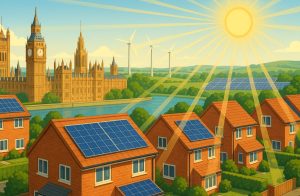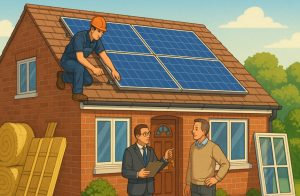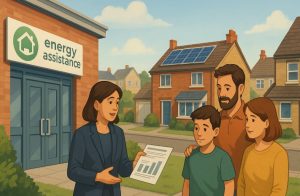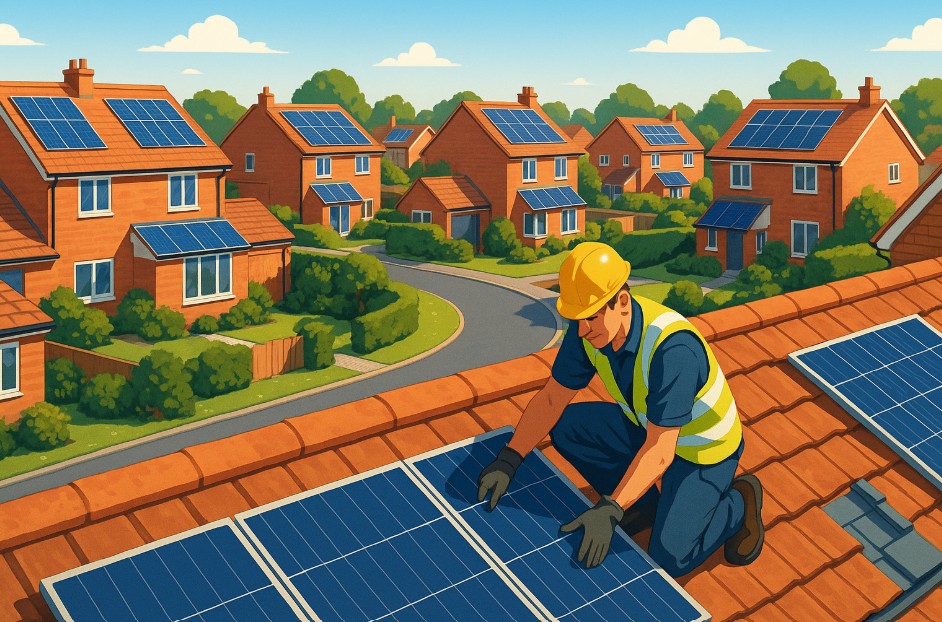Table of Contents
ToggleWhat Are the Government Grants for Solar Panels in the UK?
In the United Kingdom, there is no single, centralised grant that directly covers solar panel installation for every household. However, there exists a comprehensive range of government-backed financial schemes aimed at reducing the costs associated with adopting solar energy.
These initiatives include direct funding schemes, tax relief, and community-driven group purchasing models. Though not always labelled as “grants”, these programmes can effectively provide full or partial subsidies, especially for low-income and vulnerable households.
The leading programme, Energy Company Obligation 4 (ECO4), offers free solar panel installations to eligible households, while other schemes like the Smart Export Guarantee (SEG) provide income streams by compensating users for surplus electricity sent back to the grid.
In addition, 0% VAT on installations, Home Upgrade Grants (HUG2), and the Warm Homes Plan make solar energy a more accessible and economically viable option for a growing number of UK residents.
Collectively, these schemes reflect the UK Government’s commitment to expanding renewable energy, tackling fuel poverty, and reaching net-zero emissions by 2050.
Why Is the UK Government Supporting Solar Energy in 2025?

The government’s focus on solar energy in 2025 is part of a broader strategy to address several urgent priorities: climate change, rising energy costs, and energy security.
Solar power represents one of the most scalable and efficient ways to decentralise energy production while reducing the UK’s dependence on fossil fuels.
In 2025, this commitment is intensified due to:
- Increasing household energy costs are linked to global energy market instability
- Net-zero carbon targets mandated by law for 2050
- Expansion of green jobs and economic sectors
- Environmental sustainability and emissions reductions
Additionally, solar energy is a key component of new housing policies. For example, recent plans require most newly built homes in England to be fitted with solar panels by 2027. This move signals the increasing integration of solar technologies into mainstream housing development.
Which Solar Panel Funding Schemes Are Available in the UK in 2025?
Below is a detailed comparison of the leading government-supported solar schemes, including eligibility, potential funding, and current status.
| Scheme Name | Eligibility | Funding Provided | Availability | EPC Requirement |
| ECO4 | Low-income households on benefits | Up to 100% of the installation cost | England, Wales, Scotland | E–G |
| LA Flex (under ECO4) | Non-benefit recipients with health or income challenges | Up to 100% | Same as ECO4 | E–G |
| Solar Together | All homeowners and renters (with permission) | 30–40% group discounts | Select local councils | None |
| Warm Homes Nest (Wales) | Means-tested benefits or low-income, poor EPC | Full installation | Wales only | E or D (with medical conditions) |
| Warm Homes Plan | Low-income households, renters, and social housing | Up to £30,000 | England & Wales (from Apr 2025) | Retrofit assessed |
| SEG (Smart Export Guarantee) | All solar panel system owners up to 5 MW | 10–40p per kWh exported | UK-wide | None |
| 0% VAT | All UK residents | ~£1,900 in savings | UK-wide until 2027 | None |
| HUG2 | Low-income households in England | Up to £18,000 | Expired (ended Mar 2025) | D–G |
| Home Energy Scotland Loan | Rural/off-gas homes in Scotland | £5,000 loan (solar thermal only) | Scotland | D–G |
Each scheme has different application methods, processing times, and assessment processes, making it important for applicants to consult local councils or approved providers.
How Does the ECO4 Scheme Work?

The Energy Company Obligation (ECO4) is the UK’s flagship energy efficiency initiative, active until March 2026. It is funded by major energy suppliers and regulated by Ofgem. The aim is to improve energy performance in homes occupied by low-income and vulnerable households.
Key aspects of the ECO4 scheme include:
- Free installation of solar panels for eligible households
- Additional measures like insulation, double glazing, and new boilers
- Integration with Local Authority Flexibility (LA Flex) to broaden accessibility
Eligibility Criteria
To qualify for ECO4, the following conditions must typically be met:
- Annual household income under £31,000
- EPC rating of E, F, or G
- Receiving benefits such as:
- Universal Credit
- Housing Benefit
- Pension Credit
- Child Tax Credit
- Working Tax Credit
- Income Support
Additional considerations include household size, health conditions, and property type. Local councils can also extend the grant to those not on benefits but deemed vulnerable, through LA Flex.
Application Process
- Contact an approved energy supplier such as British Gas, E.ON, Octopus Energy, or Ovo Energy.
- Submit required documents, including proof of income, EPC rating, and ID.
- Assessment visit by a certified installer or surveyor.
- Confirmation and installation, fully covered by the scheme.
What Is LA Flex and Who Can Use It?

Local Authority Flexible Eligibility (LA Flex) is an extension of ECO4, giving local councils the power to define their own eligibility rules. This allows the scheme to help more people who may not meet national criteria but still live in energy-inefficient homes.
Typical LA Flex Qualifications
- Gross annual household income below £31,000
- Health issues exacerbated by cold homes, including:
- Cardiovascular disease
- Respiratory illness
- Immunosuppression
- Mobility impairments
LA Flex is ideal for private renters, provided their landlords approve the work. Tenants must supply landlord’s permission during the application.
How Does the Solar Together Scheme Help Reduce Costs?
Solar Together is a collective purchasing programme organised by local authorities and coordinated nationally. It’s not a grant, but a strategic procurement process that leads to bulk pricing discounts on solar panels and batteries.
How It Works?
- Residents register interest online with their local council
- A reverse auction is held where pre-approved installers bid for the group contract
- Homeowners receive a personalised offer, including projected costs, savings, and a proposed system
- Upon acceptance, a home assessment is conducted, and installation is scheduled
The typical savings through Solar Together range from 30% to 40% compared to market rates.
What Is the Warm Homes Nest Scheme in Wales?

The Warm Homes Nest Scheme is exclusive to Wales and provides fully funded energy efficiency improvements, including solar panels, to qualifying households. It also includes guidance and home energy advice.
Qualifications
- Must be a homeowner or private tenant
- Receive a means-tested benefit or have a qualifying medical condition
- Live in a home with an EPC rating of E or below (or D with health conditions)
How to Apply?
Applicants can contact Nest at 0808 808 2244 or apply through their website. A home visit and eligibility check will determine the measures offered.
What Is the Warm Homes Plan and When Does It Start?
Announced as part of the 2025 budget, the Warm Homes Plan will run from April 2025 to 2028. It is one of the most ambitious renewable funding initiatives to date, aiming to reduce fuel poverty and accelerate the adoption of solar energy.
Key Features
- Grants of up to £30,000 per household
- Targeted at social housing tenants, renters, and low-income families
- Includes solar panels, batteries, and low-carbon heating
- Managed by the Department for Energy Security and Net Zero
Households will undergo a retrofit assessment to determine their property’s needs and grant eligibility.
How Does the Smart Export Guarantee Work?
The Smart Export Guarantee (SEG) is a mandatory scheme where large energy suppliers must pay consumers for unused electricity exported to the National Grid. Though not a grant, it provides a continuous return on investment for solar panel users.
SEG Payment Rates
| Supplier | Tariff (pence/kWh) |
| Octopus Energy | Up to 15p |
| E.ON Next | 5.5p |
| Scottish Power | 12p |
| OVO Energy | 4p |
| British Gas | 6p |
Rates may vary. It’s advisable to compare providers annually.
SEG Eligibility
- Own a solar panel system under 5 MW
- Install a smart meter
- Have an MCS-certified installation
How Much Can Households Save with Government Support?
Savings from solar panels depend on system size, property type, and usage patterns. With current support schemes, homeowners can save significantly on both installation and long-term energy bills.
| System Size | Installation Cost (with VAT relief) | Annual Savings | SEG Income | Total Yearly Return |
| 3kW | £4,800 | £670 | £80 | £750 |
| 4kW | £5,800 | £730 | £100 | £830 |
| 6kW | £9,800 | £1,110 | £170 | £1,280 |
Those qualifying for full grants (like under ECO4) may have no upfront cost, which means these annual savings become immediate financial gains.
What Options Exist If I Don’t Qualify for Grants?

Not all households will meet grant criteria, but several other financial solutions are available.
- Solar loans from banks or green finance providers
- Solar subscription plans such as Sunsave and Otovo
- Green mortgages offering better interest rates for energy-efficient homes
- 0% VAT relief, saving thousands regardless of eligibility
These options help spread the cost of solar adoption while still benefiting from reduced energy bills and export income.
Are Solar Grants Available for Tenants and Landlords?
Yes. Although more complex, tenants can apply for schemes such as ECO4 and Solar Together with their landlord’s written permission. Landlords benefit from higher property values, better EPC ratings, and potential increases in rental income.
Encouragingly, the Warm Homes Plan includes explicit funding options for rental properties, aiming to support both tenants and landlords in improving energy efficiency.
FAQs on Government Grants for Solar Panels UK
Can I get free solar panels in 2025?
Yes, if you meet eligibility criteria under schemes like ECO4, Nest, or the Warm Homes Plan, you could receive fully funded solar panels.
How do I apply for ECO4?
Apply through a participating energy supplier. They will conduct an eligibility check and arrange a home energy assessment.
Do renters qualify for solar grants?
Yes, but you’ll need written permission from your landlord. Some schemes also support landlords directly.
What if I live in a rural area?
Grants like the Home Energy Scotland Loan are designed for rural or off-gas homes and offer additional support.
Is SEG a government grant?
No, it’s a government-mandated payment scheme for solar users who export surplus electricity to the grid.
What is the typical solar system cost in the UK?
A 4kW system costs between £5,000 and £6,000 after VAT relief, depending on location and complexity.
How long do solar panels take to pay off?
Most systems break even in 5–10 years, but with grants or SEG income, this can be shorter.



